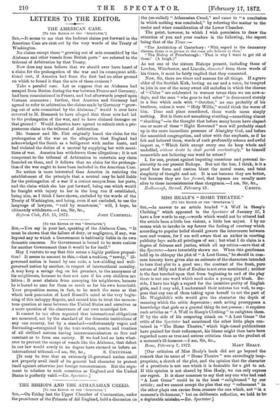THE BISHOPS AND THE ATHANASIAN CREED. [To THE EDITOR OF
THE " SPROTAT013.1 SIR)-011 Friday last the Upper Chamber of Convocation, under the presidency of the Primate of All England, held a discussion on
the (so-called) " Atbanasian Creed," and came to " a conclusion, in which nothing was concluded," by referring the matter to the cooler and wiser consideration of the Lower Chamber.
The point, however, to which I wish permission to draw the- attention of you and your readers is the following, the report- being that of the Times:— "The Archbishop of Canterbury : 'With regard to the damnatory- clauses, there is no person in this room who believes in them.'
" The Bishop of Peterborough : That is why I want to get rid of them.' (A laugh.)" As not one of the sixteen Bishops present, including those of London, Winchester, and Lincoln, dissented from these words of his Grace, it must be fairly implied that they consented.
Now, Sir, there are times and seasons for all things. If a grave.
elder of the Scottish Birk, having an ear and a voice, be tempted
to join in one of the many sweet old melodies in which the charms of " Chloe " are celebrated in warmer terms than we use now-a-- days, and the man "who goes to bed sober" is denounced sternly in a line which ends with " October," no one probably of his brethren, unless it were " Holy Willie," would think the worse of him. Time and place considered, these words mean simply nothing. But is there not something startling—something almost " shocking "—in the thought that before many hours have elapsed, one or more of these " Right Reverend" men will probably stand- up in the more immediate presence of Almighty God, and before- the assembled congregation, and utter with due emphasis, as if her felt and believed them, words of such profoundly solemn and awful import as, " Which faith except every one do keep whole and undefiled, without doubt he shall perish everlastingly," he himself
meanwhile not believing one word he utters ?
I, for one, protest against imputing conscious and personal in-- sincerity to our present Bishops. But not the less, I think, is it a
proof how form and custom blunt the moral sense, and taint- simplicity of thought and act. It is not because they are better, but because they are less formal, that laymen are usually more- alive to these inconsistencies than clergymen.—I am, Sir, &o., Rodborough, Stroud, February 13. exam's.


































 Previous page
Previous page